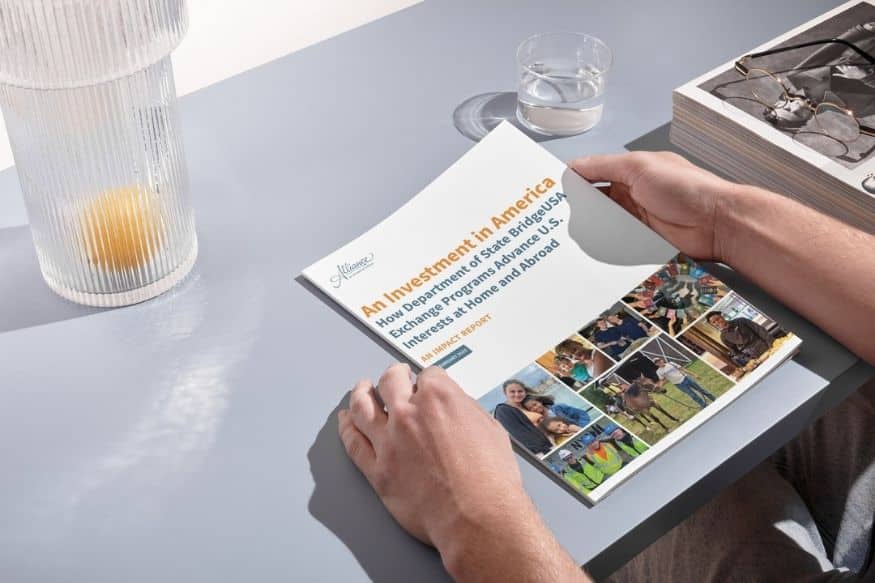
After reviewing our Host Employer Requirements and confirming your potential J-1 intern or trainee meets our Participant Eligibility Requirements, you will need to develop an internship or training program that meets the goals and objectives of the program.
CONSIDER…
When developing a J-1 internship or training program for a participant, you should be thinking about the following questions:
- Do you have the time and resources available to provide hands-on training and supervision to a participant right now?
- What kind of training can you offer and what kind of training is the participant looking for? (These should overlap!)
- Is what you are offering bona fide training and not regular work?
- What will the participant do specifically?
- How will the training enhance the participant’s academic (intern) or occupational (trainee) experience?
- What knowledge and skills will the participant gain?
- Who is providing the training and do they have the qualifications to train someone in the participant’s field?
- Are you willing and able to provide cultural activities and teach an international participant about U.S. culture?
CREATE…
The DS-7002 Internship/Training Placement Plan
Section 1
Who is the participant you will hire? Under which designation (“Intern” or “Trainee”) does he or she fit? (Note: InterExchange does not sponsor the “Student Intern” category.) What is his or her academic or occupational field? This must be directly related to the training you will offer.
Section 2
Provide this information for the actual physical location where the program will take place. If you are not required to maintain Workers Compensation or if your policy does not cover the participant, you must provide proof of exemption from maintaining coverage.
Section 3
The training plan must be hand-signed by the participant and by the supervisor mentioned in Section 2. The Signature of Responsible Officer/Name of Sponsor section should be left blank. This is where InterExchange will sign and formally execute the document.
Phase of Training
Name of Phase: The title should indicate the objective, focus or departmental rotation for this phase. If the program is longer term, you may want to consider having an introductory phase, followed by some more advanced/project-related phases. Will you have a formal introduction for the participant? Will the participant be introduced to current projects/staff? How will the entire program be broken down? What do you intend the participant to do and learn in each phase? Does the phase breakdown/timeframe meet the schedules of your colleagues or align with the structure of the various departments at your company in which the participant will train?
Brief Description of Role: What sort of role can you offer an international participant within your company? Would it be in one specific department (i.e. Marketing and then learn various types of Marketing) or can you provide training in a variety of areas? Who at your company would be able to oversee the participant’s projects? What would he or she be doing on a day-to-day basis? What is the participant’s academic/professional background and his or her interests? Can you offer practical training that will expand upon these? What would that look like? Are the assignments professional level or clerical? Think about how you intend to improve the participant’s skills in developing their role and not only how their efforts will allow you to utilize theirs. Developing a great training program depends upon both the participant’s background/goals and also those of the company or department.
Specific Goals and Objectives: Taking into account the participant’s “role” in this phase or internship, what is the end goal? What skills can you assist the participant with honing? What do you hope he or she will take away from this phase and/or be able to do independently?
Knowledge, Skills, and Techniques: Thinking about your company and the resources that you have, what specific skills will you be able to impart? Would these be interpersonal? Technical? Research? Software? Management? In order to devise a comprehensive training program, the participant should be learning a variety of skills in each phase, while at the same time contributing to your company’s work. Describe the specific, relevant knowledge and skills that the participant will gain by training with you and your colleagues.
Cultural Activities: How will your company ensure the participant experiences U.S. culture outside of the office? You may or may not have a specific event in place (e.g. a company holiday party, weekly team lunches, company softball team, etc.), but you should think about specific activities in which the participant will be encouraged to participate. Give some examples of specific events or activities in which he or she may join or cultural sites in your area to visit. What do your colleagues do in the area in their free time? Check out our Cultural Compass for ideas.
How Knowledge, Skills, Techniques are Taught: What is the method of the actual training you will provide? Maybe the participant will shadow other employees and then be able to do the same task on his or her own. Perhaps he or she will train independently with regular check-ins. How will the participant learn the knowledge and skills listed above? What are particular assignments through which he or she will advance professionally? To what types of projects/meetings/clients, etc. will the participant be exposed? What specific responsibilities and tasks are you able to offer? Providing exceptional training will help ensure you get exceptional results.
Methods of Supervision: Consider who at the company will be providing training in the participant’s academic or occupational field and serving as a resource for the participant. Does this person or people have the right background/experience to be providing it? What education or skills qualify the supervisor(s) to provide the training? Are you or your colleagues in a position where you have time to supervise an international participant on a J-1?
Methods of Performance Evaluation: It is up to you to check in with the participant and monitor his or her progress. What is the system in place for current staff? Will the participant be evaluated in a similar way? Maybe you will have a weekly meeting scheduled to touch base with the participant or perhaps you prefer to do a morning check-in before the day gets going. Also think about how the participant’s performance will be measured, e.g. a meeting or written report at the end of each phase. How will you ensure the goals/objectives/skills of the phase are reached? Regular communication will enhance the experience for both of you. Will you be able to track the participant’s progress and provide feedback and guidance? What does a “successful” intern or trainee look like at your company?
CONFIRM…
Before uploading the DS-7002 Training Plan to the online application, confirm:
- The form is typed
- There are at least 2-3 sentences or bullet points per section
- That the plan is specific and clear
- That your text fits in the display area
- You did not write, “see previous phase” or “see additional paper”
- The plan does not encompass more than 20% clerical tasks
- There is a phase (and phase page) for every 3-4 months of training
- Each phase is unique and builds upon the previous phase(s)
- That you did not copy and paste throughout the plan
- It is signed in all spaces except the sponsor signature space
Please also see:

















